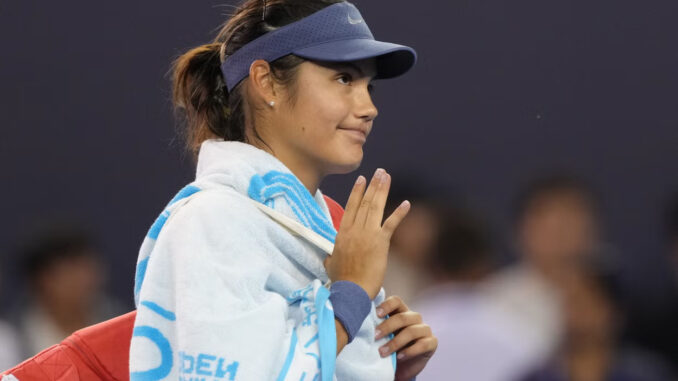
In the unrelenting pressure cooker of professional tennis, where every rally tests resolve and every defeat sharpens the soul, Emma Raducanu emerges as a symbol of unyielding determination. The 22-year-old British phenom, whose 2021 US Open victory remains a dazzling chapter in tennis history, has weathered a storm of heart-wrenching losses in recent weeks. At the Korea Open in Seoul and the China Open in Beijing, she stood on the cusp of victory against elite opponents, only to see match points slip through her grasp. Yet, as she steps into the Wuhan Open from October 6-12, 2025, Raducanu’s optimism burns bright, her belief in her progress unshaken. “I do feel like I’m improving and making progress,” she declared, her words carrying the weight of a player who sees setbacks not as endings but as fuel for her ascent. “I think my serving has been helping me out in some moments,” she added, a nod to the weapon she’s forged under new coach Francisco Roig.
The Korea Open loss still stings. Facing Barbora Krejcikova, a two-time Grand Slam champion and Wimbledon titan, Raducanu seized the first set 6-4, her aggressive baseline game and pinpoint serving rattling the Czech veteran. The second set’s tiebreak was a high-wire act—Raducanu earned three match points, each a heartbeat from glory. But Krejcikova, with her trademark composure, battled back, saving all three in a grueling 12-10 tiebreak that shifted the tide. The third set saw Raducanu’s fire dim, Krejcikova cruising 6-1 as the Briton wrestled with the weight of what could have been. “I think it was hard for me,” she admitted in Wuhan, her honesty striking. “The last two matches that I lost, I had match points in both. And it’s not something that’s really happened to me before, and then to happen twice in a week was pretty new, and to get my head around.”
Beijing delivered a haunting sequel. Against Jessica Pegula, a top-10 force and US Open finalist, Raducanu stormed to a 6-3 first-set lead, her forehand carving winners through the sticky air. The second-set tiebreak was a crucible—she led 5-2, three more match points in her grip. Pegula, however, unleashed a barrage of deep returns and fearless winners, snatching the tiebreak 11-9. The third set was a 6-0 rout, Raducanu’s unforced errors piling up as Pegula’s precision suffocated her. “I think the second match, I found it easier to get over than the first, because I know I was playing some better tennis and just improving with my level,” she reflected, finding solace in her growth. Compared to their Miami Open clash earlier this year—a 6-4, 4-6, 6-3 loss—Raducanu felt sharper. “I was dealing with Jessie’s ball pretty well compared to when we played in Miami,” she said. “I felt just a lot more competent and composed when I was playing her this time round, which was good for me.”
Raducanu’s serve, transformed under Roig’s guidance since August, has become a cornerstone of her game. Once a liability, it now delivers aces and unreturnable seconds that ease the pressure in rallies. “Just being able to get a free point here and there on the serve makes a big difference,” she said, crediting daily drills that blend precision with playfulness. Her ability to push players like Krejcikova and Pegula to the brink signals a player closing the gap to the elite, her world No. 32 ranking teetering on the edge of a top-32 year-end breakthrough that could secure a 2026 Australian Open seed.
Wuhan, set against the festive pulse of China’s Golden Week, feels like a homecoming for Raducanu, whose Chinese heritage through her Shenyang-born mother adds a personal layer to the Asian swing. The Optics Valley International Tennis Centre, framed by vibrant lavender fields and futuristic stadiums, has her enchanted. “There’s a lavender field like right across from the tennis centre, which looks pretty spectacular,” she marveled. “The scale is huge… There are two really nice stadiums that I’ve seen so far. The architecture of them are really, really nice and interesting.” Competing in this WTA 1000 event for the first time, Raducanu senses an opportunity to weave new memories in a land tied to her roots, the streets alive with families celebrating under golden autumn skies.
These losses, though gut-wrenching, are proof of Raducanu’s ascent. Her 2025 season sparkles with resilience: a 6-1, 6-2 thrashing of Ena Shibahara at the US Open, a hard-fought Miami win over Emma Navarro, and a career-best 27 victories. Setbacks against Iga Swiatek in Melbourne and Aryna Sabalenka at Wimbledon have honed her mentality, while off-court passions like go-karting and tap dancing keep her spirit buoyant. “I still see the differences in where I want to go, but I know I’m doing good work day to day to try and get there,” she affirmed, her focus unwavering.
As Wuhan unfolds, Raducanu isn’t just chasing victories—she’s crafting a legacy. Those squandered match points are now lessons etched into her resolve, her serve a growing weapon, her mindset tougher than ever. “I didn’t take too long to kind of dwell on it, and just got straight back to work,” she said, her preparation for Wuhan meticulous. With a supportive crowd and a court that feels like home, she’s poised to transform near-misses into defining moments. In a sport that demands both heart and grit, Emma Raducanu is proving that every stumble is a step toward greatness.
Leave a Reply